
by Deep Green Resistance News Service | May 3, 2018 | Colonialism & Conquest
Featured image: Gage Skidmore on flickr. Some Rights Reserved.
by Courtney Parker / Intercontinental Cry
Native Americans have long existed in a legal and cultural limbo, surviving the devastating impacts of a trail of broken treaties by the U.S. government with staunch determination to maintain their unique cultures and legal federally recognized tribal sovereignty.
In further defiance of the nearly 600 treaties that the U.S. government signed with tribal nations, the Trump administration now appears to be on the move to bring an end to that centuries-old struggle, by committing a “paper genocide.”
The phrase ‘paper genocide’ is used when a culture is wiped from mass consciousness and visible autonomy through tactics such as removing their ethnic designations from a national census – or in this case, having their sovereignty dismantled by the notion that Native America is a ‘race’ and not a diverse sum of distinct cultures and subcultures of sovereign Nations, tribes, and Peoples.
Trump slipped this into negotiations surrounding Indian health care—a move that may very well breach the Supremacy Clause of the United States Constitution which establishes that all treaties made under its authority “constitute the supreme law of the land.”
Politico broke the story on April 22, reporting, that “the Trump administration contends [that] tribes are a race rather than separate governments.
“The tribes insist that any claim of ‘racial preference’ is moot because they’re constitutionally protected as separate governments, dating back to treaties hammered out by President George Washington and reaffirmed in recent decades under Republican and Democratic presidents alike, including the Clinton, George W. Bush and Obama administrations.”
Trump, however, seems to have little regard for his predecessors.
In February of this year, a legal memo was submitted by Hobbs, Straus, Dean & Walker LLP to the Centers for Medicare and Medicaid Services in the hopes of preemptively avoiding a long, drawn-out battle with an opaque and slippery administration that has already made grotesque moves towards appropriating Native America’s remaining wealth of natural resources and sacred spaces.
The White House’s most recent budget cuts have also taken aim at crucial but extremely vulnerable institutions serving Native America – such as the Community Health Representative program under the Indian Health Service.
The newly proposed requirement that Indian Nations be subject to Trump’s naïve ‘catch all’ solution of forcing all recipients of federal healthcare funds into jobs is obtuse and out of touch with the realities of Native reservations in the U.S.
It could also have potentially disastrous consequences given the lack of employment opportunities on reserve. What’s more, this clumsy and obtuse assimilation policy runs the risk of destroying the very fabric of Native America – the remaining webs of family and culture – their very identity and existence – all towards the vulgar end of opening more land for commercial extractivism and every other industry.
Senator Tom Udall – a Democrat representative of New Mexico – is currently leading a pushback against these efforts in Congress; and, a group of Senators (including a Republican — Lisa Murkowski – from Alaska) signed a recent letter to the United States Secretary of Health and Human Services, Alex Azar. Their collectively endorsed statement issues an accusation that the Trump administration has failed,
“…to recognize the unique legal status of Indian tribes and their members under federal law, the U.S. Constitution, treaties, and the federal trust relationship.”
Although many comparisons have been made between the Nixon and Trump administrations’ scandalous tenures…even Nixon left a solid, positive legacy on Native American policies at the federal level.
Nixon advocated for a reversal of historical policy and efforts of “termination” and endorsed the concept of “self-determination” regarding federal relations with Native Americans. It is rumored Nixon’s legacy to Native Americans – which stands in juxtaposition to his historical image – stemmed from a promise he made to his mother that when he became president he’d “be good to the Indians.”
According to the
Nixon Foundation website, other instances Nixon fulfilled this legendary promise to his mother were by:
1) Returning the sacred Blue Lake to the people of Taos Pueblo in 1970
2) Enacting the Menominee Restoration Act, restoring the recognition of the previously terminated tribe in 1973
3) Signing the Indian Healthcare Act
4) Laying “the groundwork for the signing of the Indian Self-Determination Act
5) Increasing the budget of the Bureau of Indian Affairs (BIA) by 214%
6) Establishing the first special office on Indian Water Rights
7) Passing the Indian Financing Act of 1974, and:
8) Pledging that all available BIA funds be arranged to fit priorities set by tribal governments themselves.
Trump is currently forging ahead in a race to the bottom for the designation of “worst president ever” in the history of the United States; and, via his crude efforts at going after Native Americans’ very cultural and legal existence at this juncture, he may have stamped the final seal on his fate in garnering this “honor.”

by Deep Green Resistance News Service | Mar 29, 2018 | Colonialism & Conquest
Editor’s note: this is an edited transcript of Derrick Jensen’s talk, which you can listen to here.
What does it mean to decolonize my heart and mind, and how do I go about doing that?
by Derrick Jensen / Deep Green Resistance
Many indigenous people have said to me that the first and most important thing we have to do is decolonize our hearts and minds. Part of what that means is to question every assumption that you ever had about the way life is. Many indigenous people have told me the most important difference between indigenous and western ways of being is that even the most open-minded westerners perceive listening to the natural world as a metaphor rather than a literal action. Indigenous people around the world generally perceive the world as consisting of other beings to enter into relationship with and to whom we have responsibility, as opposed to resources for us to exploit.
“When I look at trees I see dollar bills.”
If you look at trees and see dollar bills, you‘re going to treat them one way. If you look at trees and see trees, you‘ll treat them another way. And if you look at this particular tree and see this particular tree, you‘ll treat them differently still. The same is true of course for women, which is one reason I am so completely opposed to pornography; when I look at women and I see orifices, I‘ll treat them one way; if I look at women and I see women I‘ll treat them another way, and if I look at this particular woman and I see this particular woman I‘ll treat her differently still.
How you perceive the world affects how you behave in the world. So, a lot of the decolonizing is to change unquestioned assumptions that control how you perceive and act in the world.
A young writer approached Anton Tschechow and said he wanted to write a story and he didn’t know what to write. So Tschechow said: “I want you to write a story about a man, who squeezes every drop of slave’s blood out of his body.”
We have been trained since infancy to be slaves to the system. To be addicted to the system. The word “addict” comes from the same root as the word “edict,” and it means “to enslave.” In ancient Rome, a judge would issue an edict, that would addict someone to someone else, that would enslave them.
We are enslaved to the system, and we need to squeeze every drop of slave’s blood out of ourselves. Another way to look at this is to recognize that, as Robert J. Lifton has written about so well, before you can commit any mass atrocity you have to convince yourself that what you‘re doing is not in fact an atrocity, but instead a good thing.
So the Nazis were not committing genocide and mass murder, they were instead purifying the Aryan race. The North American settlers were not committing genocide and mass murder and land theft, they were manifesting their destiny. Today, nobody is killing the planet, they are instead developing natural resources.
I shared a stage with Ward Churchill one time and we were chatting backstage, and I said ”I can‘t believe how stupid the Nazis were to take such careful records of their atrocities, meticulous records of how much gold they pulled from teeth … why would they take such strict records of these terrible actions?” He just looked and me and said, “Derrick, what do you think the GNP is?“ GNP is a very highly detailed description of the conversion of the living to the dead, of the dismemberment of the living planet.
So part of decolonizing is to recognize that things we think are good, like civilization, like industrialism, like developing natural resources, may in fact be quite terrible and atrocious. This is absolutely crucial work. One of the things that happens through this process that is crucial to decolonizing is transfering your loyalty away from the dominant system and toward the landbase. This is pretty much what all of my work is about. Once you transfer your loyalty to the landbase, everything else is just technical, you know, what to do then. But until you do that your loyalty will still be, by definition, with the dominant culture.
When I do resistance radio interviews, I‘m always very clear before the interview that you can be as biocentric and ecocentric as you want. If we‘re talking about the Mississippi River, or talking about the Colorado River, or the Columbia River, I don‘t actually care about agriculture. My loyalty is completely with the river. If the water stays in the Colorado River, I don‘t care if that means that cotton growers will be driven out of business, or that golf courses in Arizona will go dry. Because my loyalty is not with industrial capitalism; my loyalty is with the living planet.
How do we do it? We start to question every assumption. There is a sense in which it‘s very easy and a sense in which it‘s really hard.
The sense in which it‘s very easy is that, like many environmental activists, we begin by wanting to protect a specific piece of ground. But we end up questioning the foundations of western civilization. That‘s because we start to ask questions, and once the questions start they‘ll never stop. So we can ask: why is this land being destroyed? And the answer is usually: because someone is going to make money off of it. Or economic production; it‘s good for the economy. Then you ask: why is most land harmed? Well, it‘s good for the economy.
So then you ask: have all cultures had economies based on destroying their land base? No. And then you ask: what does it mean that you have an economy based on destroying the land base? And then you ask: what is the endpoint of having an economy based on destroying the land base? And of course, the answer is obvious: you destroy the land base, and you destroy the capacity of the earth to support life. As we see.
In that sense decolonizing is really easy. All you have to do is to ask one question. It‘s the same with rape culture. You ask: why was this woman raped? Then you ask: why is any woman raped? Why are so many women raped? Has every culture been a rape culture? And once those questions start, you head back to the roots of the problem. In the case of rape, the patriarchal violation imperative, in the case of civilization, well, civilization’s economic arrangements, and also the patriarchal violation imperative.
In another sense it‘s very hard. You have to give up on everything that brought meaning before. You die, that‘s the point. That‘s a very scary process, and it can be a very painful process, it‘s a process that many of us went through in our twenties. There is that great line by Joseph Campbell: if the signs and symbols of the dominant culture work for you, then there will be a sense of meaning in your life and a sense of accord with the universe. If the signs and the symbols of Catholicism work for you, then you have a 2000 year old path of meaning laid out for you.
If the American Dream works for you, and making money brings you meaning, then you have a couple of hundred years system of meaning set out for you. I would say that meaning is really perverse, but we‘ll leave that. Campbell then says: if those signs and symbols don‘t work for you, then basically you‘ll find your life meaningless, and you‘re set adrift. Then you have to go on what he called a hero journey, and I‘m sorry for the sexism of the language. That‘s the journey, that we all have to find to go through, to find meaning in our own lives.
Life consists of a series of deaths and rebirths. It‘s pretty extraordinary that the central message of the Jesus story is completely missed. It‘s not that Jesus was a real human being who died and then was resurrected; instead it‘s that for a new part of us to be born, an old part of us has to die. This is true in any case. When we are in our late teens and early twenties, we have to die as children to be born as adults. That part is left behind, and a new part emerges. That can be incredibly painful and scary, which is why cultures around the world have had social means by which the young people would be shepherded through that process.
We don‘t have that. We certainly don‘t have any social approval for it. Instead, people are pulled back into the culture at every moment. This culture tries to bring us back through television, through books, through economically forcing you to stay in the system, making you economically dependent upon the system by telling you that you are a consumer, and not a citizen or a human animal who needs habitat. It‘s constantly reinforced. But if you can find another community, a community of people who value living trees over dollars, who value the real world, whose loyalty is with the real world, that can really help this passage.
The really difficult part of decolonizing is that it involves a great definite death and rebirth. A death of faith that the system will work out, a full internalization of the understanding that the dominant culture hates life, and that the dominant culture will kill everything on the planet unless it‘s stopped. That‘s what decolonization feels like; it‘s the death of one‘s loyalty to the system that raised you.
If space aliens had come down from out of space, and were vacuuming the oceans, changing the climate, putting dioxin in every mother‘s breast milk, obliterating the planet and giving us computers, and tomatoes in January, and whatever goodies we want; if space aliens were doing this, most of us would not have a hard time decolonizing because we would see it. But after five, and ten and fifteen generations, people won‘t see it any more.
One of the reasons we‘ve become so stupid about this is because from childhood we pledged allegiance to this culture. We were taught that this culture is more important than a living planet.
Once again, we need to think about this as though it were space aliens who were destroying the planet. Because it doesn’t really matter who is destroying the planet; they are destroying the planet and they need to be stopped.
So for me, the process of decolonizing has, as its very essence, making one‘s loyalty to the real world.
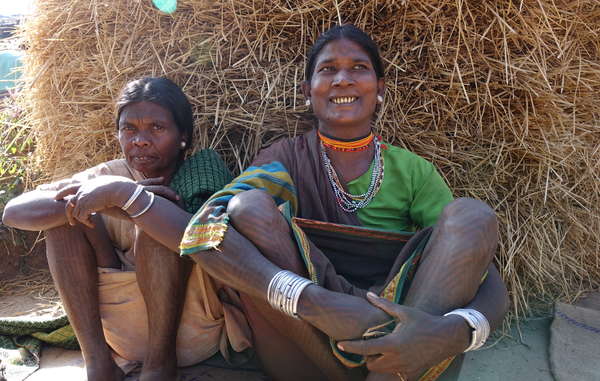
by Deep Green Resistance News Service | Mar 15, 2018 | Colonialism & Conquest
Featured image: Baiga women threatened with illegal eviction, Achanakmar Tiger Reserve. The villagers are determined to stay and say they don’t want to leave their forest home. © Survival International
by Survival International
Hundreds of Baiga people from the area that inspired Kipling’s The Jungle Book are rallying to oppose the authorities’ attempts to evict them from the forests that they have lived in and managed since time immemorial.
Baiga tribespeople are joining forces from over 70 different villages in an area of 1,500 square kilometres. The protests have been sparked by official efforts to evict two Baiga communities from a wildlife “corridor.” Dozens of neighboring Baiga communities are now terrified they will be next, as they face poverty, exploitation and misery if forced from their homes.
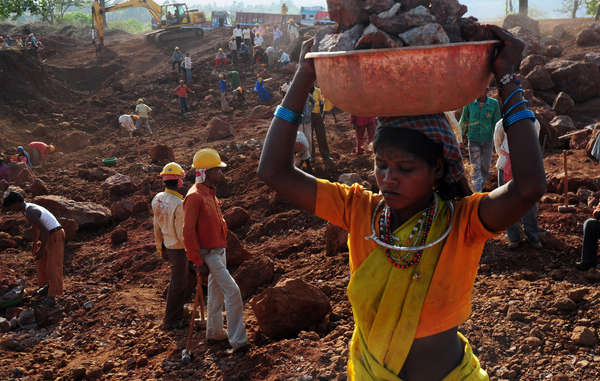
The fate that could await many Baiga threatened with illegal eviction: a Baiga woman works for a pittance in a bauxite mine. © Sayantan Bera/Survival
The Baiga are particularly worried by the two upcoming evictions, as both state authorities and the World Wildlife Fund (WWF) promised that evictions would not take place in the “corridor” areas, which run between the protected nature reserves.
By law, any resettlements of tribal people must be voluntary, even for those living in designated conservation areas. However Baiga people report threats, intimidation and violence until they have no choice but to leave their homes.
Baiga elder, Bhardan Singh told Survival International: “The forest guards beat me until I fell from the tree. I split my hip bone and couldn’t stand. I crawled to the edge of the park. The guards just left me and walked away.”
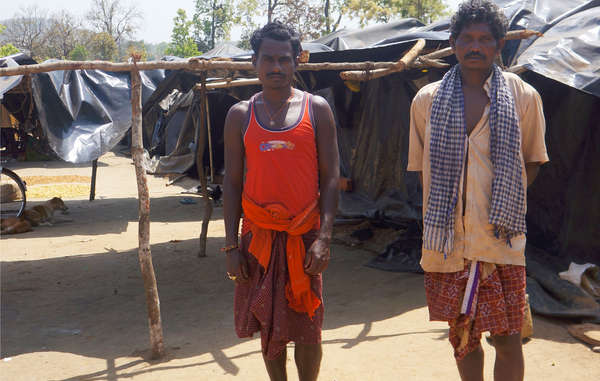
These Khadia tribespeople were evicted from a tiger reserve and forced to live for months under plastic sheets. Promises of “compensation” are rarely fulfilled. © Survival
This weekend’s protest is a local flashpoint in an ongoing national issue. Tribal peoples living in tiger reserves across India are being forced to leave their ancestral homelands in the name of tiger conservation. However, tiger numbers have increased rapidly in the first reserve in India where a tribe won the right to stay on their land, showing people and tigers can flourish alongside one another.
Survival International, the global movement for tribal peoples’ rights, launched a tourist boycott in November last year, urging visitors to India not to visit any of India’s tiger reserves until the Indian tiger authority respects tribal peoples’ rights to live in and protect their forests.
Survival Director Stephen Corry said: “These evictions, both inside and outside the tiger reserves, are totally unjustified, as well as illegal. Not only do they destroy the lives of the people forced from their homes, but they don’t help the tigers either. The authorities and WWF promised there would be no evictions – as so often in the past, such promises have proven worthless.”
Background briefing
– Baiga means “medicine man.” Baiga people are known for their distinctive tattoos, and for their very close relationship to their environment.
– Tribal people were evicted from Similipal tiger reserve in 2013, and were soon after found living in dire conditions under plastic sheets.
– Many Baiga were evicted from the nearby Kanha tiger reserve in 2014. They received no land, houses, or support but were supposed to find land to buy with their compensation money, an alien concept for those who’d lived all their lives in the forest. They told Survival: “We got some money, but we are lost – wandering in search of land. Here there is only sadness. We need the jungle.”
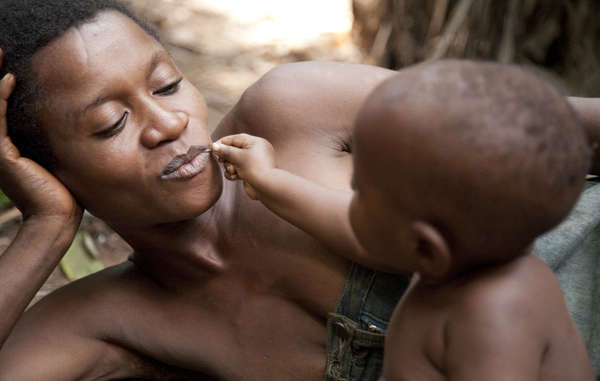
by Deep Green Resistance News Service | Mar 9, 2018 | Colonialism & Conquest
Featured image: The Baka are better at looking after their environment than anyone else. © Selcen Kucukustel/Atlas
by Survival International
Four Baka – two women and two men – were beaten up by eco-guards in the Republic of Congo last week. The Baka had just returned to their village, after spending the day in the forest, when a squad of eco-guards arrived and accused them of hunting elephants.
Survival has received reports that the two Baka men were arrested and are now in prison, even though the eco-guards found no evidence that they had been hunting.
A similar case of abuse was reported in a neighbouring community a week earlier, around 23 February: a group of Baka were coming out from the forest when eco-guards beat them up and arrested them.
Eco-guards are patrolling huge swathes of north-east Congo Republic, including regions which are not officially recognized as “protected” areas. They are funded and equipped by WWF and according to several sources, are spreading terror among Baka in the name of conservation.
A Baka man told Survival: “They always do that kind of abuse, especially to Baka. They need to beat people to show they are doing a good job.”
Eco-guards are also involved in other cases of abuse, harassment, torture and arrest of innocent Baka people. One case, in early 2017, was described as a “catastrophe.” The guards made Baka men, women and children strip to their waists, get to the ground and “crawl like snakes” while the guards kicked and whipped them with their belts.
Physical violence is just one part of the abuse that tribal people have to face in the name of conservation. Eco-guards regularly steal Baka food, burn their homes and destroy their tools.
“The eco-guards came here to abuse us for nothing. Every time it is beatings and whippings–and they break our radios, and pierce our cooking pots,” says one Baka man.
Today the Baka say they do not feel free to move around and live in their ancestral land. The climate of fear is so strong that they feel unable to hunt, fish and gather plants to feed their families, with serious consequences for the Baka’s health and well-being.
These abuses are not just illegal: they are harming conservation. Targeting tribal hunters diverts action away from tackling the true poachers–criminals conspiring with corrupt officials–and harms conservation.
Moreover, the big conservation organizations are partnering with industry and tourism and destroying the environment’s best allies. Like many tribal peoples, the Baka know better than anyone else how to take care of elephants and other wildlife in their forests.
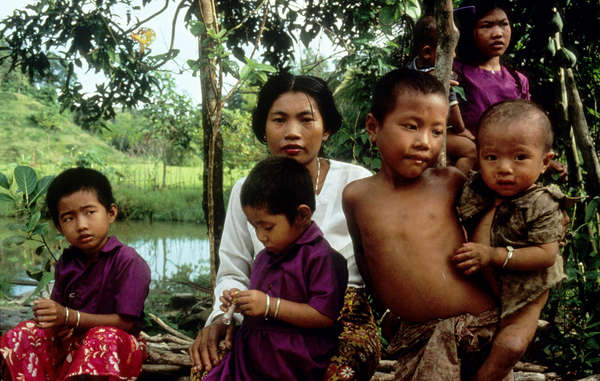
by Deep Green Resistance News Service | Feb 18, 2018 | Colonialism & Conquest
Featured image: The Marma, like other tribes of the CHT, have faced years of violence, land-grabbing and intimidation. © Mark McEvoy/Survival International
by Survival International
Two sisters from the Marma indigenous tribe of the Chittagong Hill Tracts in Bangladesh are being held against their will after being raped and sexually assaulted at gun point, allegedly by members of the Bangladesh security forces.
The Jummas, a collective name for the tribes living in the CHT, continue to face endemic violence, land-grabbing and intimidation on their ancestral land. Jumma women and girls are frequently subjected to rape and sexual assault at the hands of Bengali settlers and the armed forces.
The Marma girls, aged 19 and 14, describe men in army uniforms entering their house during a raid in the early hours of January 22. They report that the older sister was raped and the younger was sexually assaulted during an attempted rape.
The army and other security forces have denied the attacks took place, and the authorities are now not allowing the girls to be released from hospital. Their room is being guarded by police who are refusing to allow human rights activists or journalists to talk to the victims.
The sisters fear for their own, and their family’s, safety. Those who have been able to speak to the girls report that they are traumatised, not only by the initial brutal attacks but also by the numerous interrogations by male police officers and the entry of male security personnel into their hospital room throughout the day and night.
The girls speak only their tribal Marma language and have been refused access to familiar indigenous food brought to the hospital by well wishers.
Raja Devasish Roy, the Chakma king, Survival and other human rights activists have called for the girls to be released from the hospital and for the perpetrators to be brought to justice.
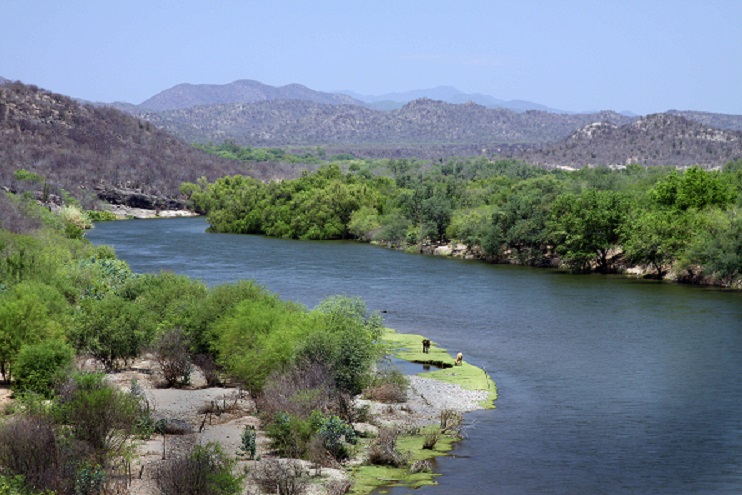
by Deep Green Resistance News Service | Jan 30, 2018 | Colonialism & Conquest
Featured image: The Aguaprieta pipeline crosses the Yaqui River (Río Yaqui), the water source for the Yaqui, an indigenous tribe residing in the Yaqui Valley in Sonora, Mexico. Photo: Tomas Castelazo (CC). As far as one Yaqui community is concerned, the pipeline will never be completed.
by Gabriella Rutherford / Intercontinental Cry
In 2013, Enrique Peña Nieto’s government deregulated Mexico’s energy sector, opening it up to foreign investors for the first time 75 years. In what he called an “historic opportunity”, the Mexican President proclaimed “This profound reform can lift the standards of living for all Mexicans.”
But not everyone stands to see their quality of life materially improve from the deregulated sector. Such is the case for the Yaquí Peoples in Sonora state, Mexico, whose territory is currently home to an 84-kilometre stretch of natural gas pipeline.
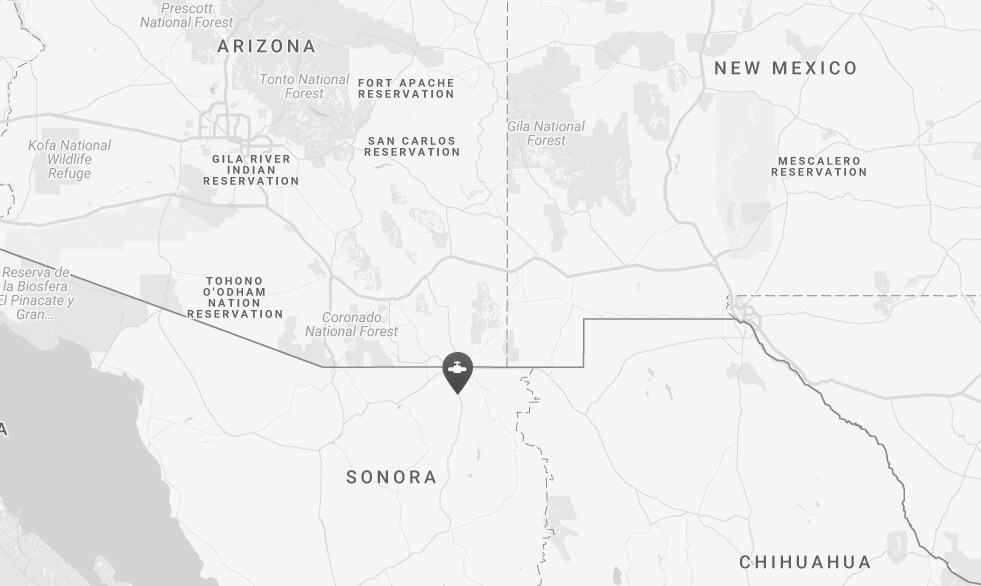
The Aguaprieta (Agua Prieta) pipeline starts out in Arizona and stretches down 833km to Agua Prieta, in the northeastern corner of the Mexican state of Sonora—cutting through Yaqui territory along the way.
Once completed, the pipeline would also cross Yaqui River (Río Yaqui), the Yaqui’s main source of water.
More than a few Yaqui are adamant that they will see no benefits from the project. “The gas pipeline doesn’t help us, it only benefits businessmen, factory owners, but not the Yaqui” said Francisca Vásquez Molina, a Yaquí from the Loma de Bacúm community.
As with Keystone XL and Dakota Access pipelines, the Aguaprieta project comes with its own share of risks.
In addition to the considerable environmental impact that stems from the pipeline’s construction, the high methane content of natural gas could bring on disaster. Rodrigo Gonzalez, natural resources and environmental impact expert, maintains that in the event of a gas explosion all human, plant and animal life within a one-kilometre radius surrounding the explosion would be lost. Anyone within the second kilometre would risk second and third-degree burns.
In the community of Loma de Bacúm, the gas pipeline is just 700 m from houses. In nearby Estación Oroz, it is 591m from a primary school.
Gonzalez has pointed out that another viable route for the pipeline was initially considered by the company that could have avoided Yaqui territory altogether. He suggests this route was ultimately rejected to save costs. “At the beginning of the project, two routes were mooted. That which didn’t cross indigenous territory cost 400 million pesos whilst that which puts Yaquí lives at risk costs 100 million pesos.”
IEnova, the company behind the pipeline, has repeatedly made assurances that all due safety procedures have been followed in construction and that the risk of accidents is minimal but this has not been enough to assuage the fear or anger of everyone opposing the gas pipeline.
In a public statement last year, the group Solidaridad Tribu Yaquí said, “This is a people that say no to a megaproject of death, dispossession and destruction[…]These rich men don’t care about the life of one, two, or three people, much less if they are indigenous… [they] don’t care if the Yaqui culture is exterminated. What is important to these rich men is to conclude the work and pocket all the profits to be brought about by the appropriation of the Yaqui territory.”
Not all Yaquí communities are united in rejecting the gas pipeline, however. Indeed, of the eight Yaquí communities consulted, only the Loma de Bacúm community refused to give their consent to the project. The other seven communities chose to accept the compensation offered. This decision has sadly resulted in tensions between Loma de Bacúm and the other communities. Things reached a critical point in October 2016 where one Yaquí member died and thirty injured in a confrontation involving different Yaquí communities.
Seemingly alone in their struggle, the Loma de Bacúm Yaquí have consistently resisted the Aguaprieta pipeline. In April 2016, they successfully fought to be granted a moratorium on its construction. When, in 2017, it became clear that IEnova, would carry on regardless and that neither federal nor state or authorities could be counted on for support, the Loma de Bacúm community resorted to more drastic measures. On May 21, community members removed cables which had been laid down in the preliminary stages of the gas pipeline construction. Then, after another court ruling that IEnova should remove all infrastructure within 24 hours fell on deaf ears, on August 22 the community went ahead and cut a 25-foot section out of the live gas pipeline, despite the grave risks they ran in doing so. As a result of the community’s actions in August, IEnova was forced to cut off the gas flow in the area and it has remained out of service ever since.
The community has been accused of sabotage and vandalism to IEnova property but the community maintains that IEnova, a company owned by US-based Sempra Energy, is trespassing on their land and holds them responsible for all damage brought on by the construction of a pipeline to which they never consented.
In a video shared on Facebook, one community member explained “If you want to have us killed, there’s no problem. We’re not scared of that… We’re not scared of this company nor this project…All that the Yaquí tribe is asking for is that the law is upheld and that federal and state government respect it. If you want to have us killed, go ahead there’s no problem but we’ll defend our land and that is our right.”
In September 2017, a judge once again found in favour of the Yaquí community ruling that IEnova did not have the right to enter Yaquí territory to repair the gas pipeline. Whether this latest ruling will carry more weight with both local and state authorities than the previous ones remains to be seen.
For the time-being, the stand-off looks set to continue. Loma de Bacúm has made it clear it will not back down until the pipeline is removed or rerouted. “If they want to build a pipeline. that’s fine”, said community spokesperson Guadalupe Flores, “but it will not pass through here.” At the same time, IEnova refuses to accept that one small community can curtail their plan to use Yaquí territory in order to provide electricity to the Comisión Federal de Electricidad (CFE), the country’s largest electric utility. Nor does it seem willing to brazenly defy the court’s latest ruling, at least for the time-being.
The struggle in Loma de Bacúm echoes loudly among all Indigenous Peoples who are grappling to make sure the resource sector cannot run roughshod over human rights and environmental concerns; but it is perhaps loudest in Mexico. Since the new energy policy went into effect, four other pipeline projects have been suspended. Looking ahead, a “shale offensive” is now set to begin later this year should the PRI retain power in July, leading to a proliferation of similar conflicts.









